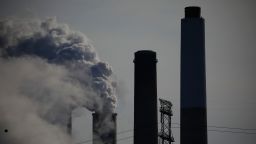Editor’s Note: John D. Sutter is a CNN contributor, National Geographic Explorer and MIT science journalism fellow. He is director of the forthcoming BASELINE documentary series, which is visiting four locations on the front lines of the climate crisis every five years until 2050. Visit the project’s website. The opinions expressed in this commentary are his own. View more opinion at CNN.
Over the years, I’ve been tempted to look for some sort of atmospheric savior — a person or technology, a clever strategy or institution that could bail us out of the climate crisis.
It’s become abundantly clear that no such savior exists.
Thursday’s ruling from the US Supreme Court is a painful reminder of that.
SCOTUS’ opinion addresses what might seem like a minor detail of how the Environmental Protection Agency regulates carbon dioxide emissions from power plants.

Don’t be fooled, though. That the court limited the EPA’s power to push toward carbon neutrality is a massive blow. It sets the United States back in its efforts to eliminate fossil fuel pollution. That’s a task on which we already are decades behind. The world is likely to continue to become a more dangerous place — and a more unequal place — because of this decision.
Some details of the opinion are particularly troubling. In the 6-3 decision, the court rejected the idea that the US Environmental Protection Agency could use a sort of “system” thinking in its regulation of the power sector. Congress has not given the agency that authority, the court ruled.
Rather, the ruling implies, the EPA might regulate power plants one by one — as if the global carbon system, the atmosphere and the future of humanity do not hang in the balance of how the power system, as a whole, functions. Climate change, meanwhile, actually requires system thinking. One power plant, one sector, one nation cannot solve this alone.
This highlights what is a central problem of efforts to halt the climate crisis: It’s everyone’s problem and no one’s.
The issue is a hot potato that gets passed between branches of the US government – Congress should fix this! No, the courts! – while the Earth bakes. This holds true on an international scale. My head might explode if I hear one more fossil-fuel apologist point to China or India’s rising emissions as rationalization for global inaction. The truth is the United States has polluted the atmosphere more than any other nation. For that reason, and because of our international sway, this county’s response is hugely important.
Describing the court’s decision as a blow to the Biden administration, as many have done, is hopelessly myopic, by the way. This is one of millions of self-inflicted wounds that puts all of Earth’s systems in jeopardy. We simply cannot continue passing the blame — or, worse, obfuscate the truth of global warming’s urgency — with clever legal language and excuses.
“[L]et’s say the obvious,” Justice Elena Kagan wrote in dissent. “The stakes here are high. Yet the Court today prevents congressionally authorized agency action to curb power plants’ carbon dioxide emissions. The Court appoints itself — instead of Congress or the expert agency — the decision-maker on climate policy. I cannot think of many things more frightening.”
Same here.
Stepping back from the court’s opinion, this is the 36.4 billionth reminder that this is an all-hands-on-deck moment for climate action. Obama’s Clean Power Plan, ostensibly the subject of the court case, couldn’t fix this. The courts can’t, either, apparently, as many of us had hoped.
My hopes for a cleaner/safer atmosphere were buoyed in 2015, for example, when a court in The Netherlands declared the government’s climate policies inadequate and ordered them to be strengthened. Another case against the fossil fuel giant Shell also was successful last year.
Similar arguments have been tried in the United States and elsewhere, with varied results. When a group of kids brought a case to federal court in Oregon in 2016, I wrote that this could be it. The kids asked the courts to do the thing that Congress hadn’t: force the adoption of sane climate policy. Perhaps courts could be the missing piece in this fight.
Of course, that case hasn’t gone much of anywhere; attorneys during both the Obama and Trump administrations pushed back against its constitutional claims.
Hope feels like a distant emotion these days.
Looking to Congress or the Biden Administration is cold comfort, too. Yes, Biden (sort of) campaigned on the climate crisis, calling it one of “four historic crises” his administration would tackle. The world seems to conspire to thwart good intentions. Congress has failed to pass Biden’s signature climate legislation as part of the Build Back Better plan, essentially, because of Senator Joe Manchin, who apparently represents coal and West Virginia, not the atmosphere or the future or people being walloped by climate-related disasters.
Some put their faith in the market, which has led a shift in the United States toward (less-polluting) natural gas and away from coal, with or without the Clean Power Plan.
That shift is not guaranteed and it’s nowhere near fast enough. The International Energy Agency’s World Energy Outlook said in October that fossil fuel use may peak in the middle of this decade, but that the shift is not rapid enough to avoid escalating climate dangers.
Tech is another logical fix. Again, there’s some progress. Another IEA report this week cited reason for hope that “nuclear [power] is well placed to help decarbonize electricity supply.”
Still, we’ve had the technology — wind and solar — needed to reduce greenhouse gas emissions for years and years; the trouble is that none of these ideas is adopted widely or quickly enough.
I could spend all of your time recounting missed opportunities for climate action, which extend back for more than three decades; we’ve known about this crisis longer than that.
I’m not sure that’s helpful now, though. And I’m not 100% sure what is, actually.
Perhaps it is important to remind ourselves, countervailing evidence aside, that we do live in a democracy. Government should respond to the people. And if the people, from West Virginia to Washington state, actually demanded not just climate talking points but serious climate action — rid-the-economy-of-fossil-fuels type of action — we could do this.
Historically, it’s proven difficult to prioritize eliminating fossil fuels in the face of the shifting winds of American politics, news and life. The war in Ukraine also is a serious crisis, and one that has prompted soaring gas prices. But that’s no reason to support fossil fuel extraction. We must work to remind ourselves that the climate crisis is every bit as urgent as other crises, even if its long-term, slow-moving nature keeps it out of the headlines much of the time.
Our best hope is that outrage about the Supreme Court’s shortsighted, dangerous decision this week will fuel not the fossil fuel industry but the energy of the American public.
It’s hard to feel that now, but the feeling will return. Because the truth is that if the branches of the US government won’t stop global warming, then people must make it happen. Not by swapping lightbulbs and buying new cars. But by gaining and then asserting political power.


